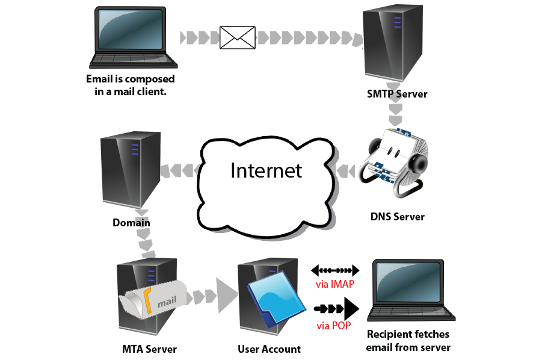Email Hosting -- What Type Is For You?
February 26th, 2019

When an email is sent to you, it goes from the sender, to their provider, to your provider, then to you. There are different protocols which can be used to retrieve the email from your provider by your email client (the program that you use to read and compose your email), and they each function differently.
The three most common protocols are POP3, IMAP, and Exchange.
POP3: This used to be more common but is quickly fading out with the changes in available technology and access. With POP3, the email is downloaded by your client (Outlook, Thunderbird, etc.), stored locally, and deleted from the server. Because the email is downloaded to one computer, it is not available to another. What this means is that when you get your email on your laptop, the email is not available on your phone. POP3 has very quickly become the least favorable for this reason. The only time POP3 is really used today is in cases where the same email set up has been in place for 10+ years.
IMAP: This protocol works by storing all the emails on the server. All emails sent and received, along with the folder structure used to organize it, are on the server. This is great for a few reasons. First, you don't need to worry about backups. Everything is already stored in the cloud. The second and most useful reason is that you have access to your email on multiple devices. Your email account stays the same across all devices. For instance, when you read, delete, and send an email on your phone, it is marked the same on your laptop, desktop, and so on.
Exchange: This is very similar to IMAP, but much more comprehensive. Not only does it keep your emails in sync, but it keeps your contacts and calendars synced up across multiple devices. The big issue, however, is that Exchange is proprietary to Microsoft, which means you really don't have a choice but to use Outlook. The monthly hosting cost is usually significantly more expensive, so you'll want to make sure these features matter before choosing Exchange to host your emails.
So how should your email be hosted?
- If you're using POP3, have been using it for years, and don't want any additional features or accessibility, keep it as is (but make sure you back it up).
- If you use multiple devices and enjoy a seamless experience, then IMAP should be your choice.
- If you need your calendar, contacts, and email synched across all devices, and the cost makes sense, then Exchange might be the right choice.
Hyperion Works provides all three hosting options. If you want some assistance with the decision, give us a call to talk to an expert.
Sign Up!
Enter your name and email address below, and receive these excellent bit of helpful info on a regular basis.
